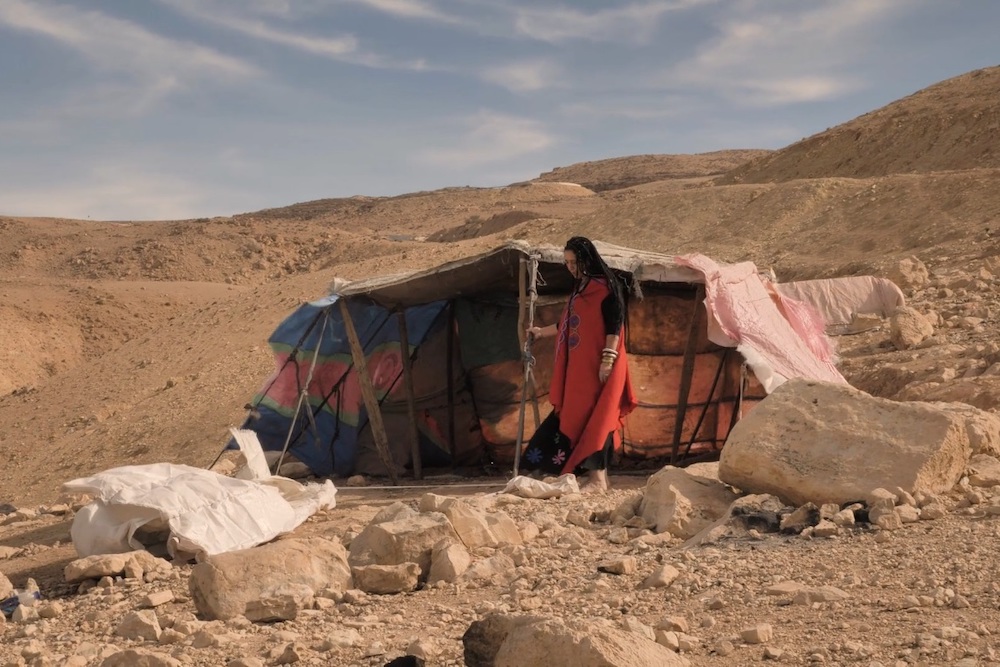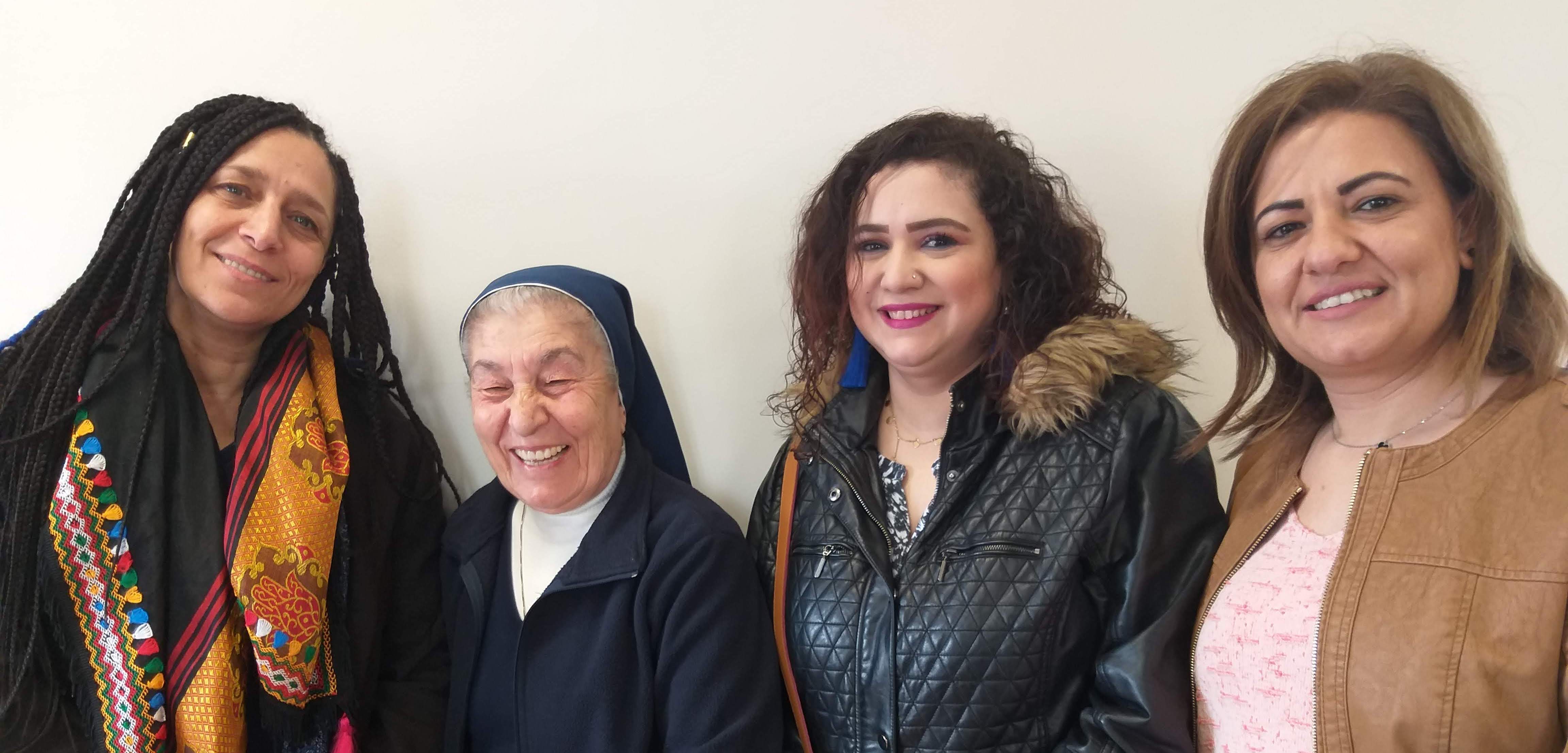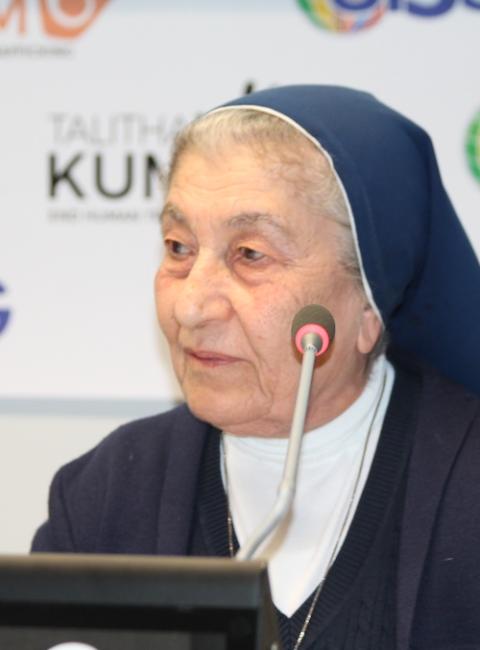
A still image from the documentary film "Wells of Hope" (Aurora Vision)
A new documentary film uses the power of storytelling to illustrate the horrors of human trafficking.
Set in the Middle East and focusing on the experiences of young women in the region, the 30-minute "Wells of Hope" is a poignant and powerful example of storytelling, Loreto Sr. Patricia Murray, the general secretary of the International Union of Superiors General, said following a recent preview of the work in Rome, where UISG is based.
"I feel deeply moved," Murray said of the film, which was directed by Lia Beltrami and includes testimonies from sisters involved in anti-trafficking work.
The film is produced by Aurora Vision, which specializes in films about humanitarian issues. Talitha Kum, the global anti-trafficking network of religious under the aegis of UISG in collaboration with the Union of Superiors General, commissioned the documentary.
Advertisement
The film is produced by Aurora Vision, which specializes in films about humanitarian issues. Talitha Kum, the global anti-trafficking network of religious under the aegis of UISG in collaboration with the Union of Superiors General, commissioned the documentary.
The short film is intended "to present the idea of Talitha Kum in the Middle East," Comboni Missionary Sr. Gabriella Bottani, Talitha Kum's international coordinator, told Global Sisters Report.
"Wells of Hope" shares its name with Talitha Kum's interfaith initiative in the Middle East, which has created "a network of women of different faith traditions together against human trafficking" in Lebanon, Syria and Jordan, Bottani said.
The film came about when those involved with Talitha Kum's work in the Middle East asked for "a tool to raise awareness and to present the topic of human trafficking in the region," she said.
Nassim Alwan, a librarian and professional story teller based in Lebanon, acts as the documentary's storyteller, relating the experiences of human trafficking.
At a Feb. 27 news briefing in Rome, Alwan said she tried "to bring a reality to my storytelling. In telling it, I felt the story was very close [to me]. I felt how serious it was. It's something that really touches a woman."

Participants in "Wells of Hope" included, from left: storyteller Nassim Alwan, Wells of Hope Lebanon; Sr. Marie Claude Naddaf, regional coordinator of the Wells of Hope network; Esra'a Ali Salameh Alsheyab, Wells of Hope Jordan; and Wafa Aqeel Saleem Almakhamreh, Wells of Hope Jordan (Provided photo)
Bottani told GSR that when she met Alwan in July 2019, "I was impressed by her powerful way to tell stories." Even though Bottani, who is Brazilian, does not speak Arabic, Alwan "was able to touch my heart," she said.
The film is structured around Alwan telling the story of a young Syrian refugee named Shaima, whose life takes a tragic turn when she accepts an offer of marriage to a man in Turkey who turns out to be an imposter and involved in a human trafficking network.
Interspersed with the narrative are scenes of everyday life in both urban and rural locales, as well as with sisters and activists involved with Talitha Kum's work in Jordan. The lay workers are Christian, Muslim and Druze women.
Given the "new phenomena of trafficking caused by war and refugee movements, we can be that little flame that illuminates the path of these women and children so that they can get out of their condition," Sr. Marie Claude Naddaf, the Lebanon-based coordinator of Wells of Hope who is featured in the film, said at the news briefing.
Early in the film, Bottani speaks passionately about the strong stance women religious have made against human trafficking — an exploitation, she said, "to which religious women said, 'We are not having it.' We are saying 'no' to being indifferent."

Sr. Marie Claude Naddaf, regional coordinator of the Wells of Hope network (Provided photo)
Murray, in a March 5 interview with GSR, reiterated the importance of the documentary, saying it takes "a feminine approach" in its narrative. Using a storyteller "is a way of telling a dark story that provides hope," she said, adding that the work of Wells of Hope and Talitha Kum is "countercultural" because it is "long-haul work" in a "world that it is not geared to the long-haul."
Bottani said the documentary is a milestone for Talitha Kum, which celebrated its 10th anniversary in 2019, and could be an "initial step" in efforts to promote its work and the message of addressing human trafficking.
"Hopefully other ideas will follow from it," she said. "We hope to build on it."
Bottani said the film had been entered in the Nepal Human Rights International Film Festival, though she noted that the festival, scheduled for this month, has been postponed because of concerns over the spread of COVID-19.
Naddaf said at the Feb. 27 event that those involved in the film "are aware that we are a small effort" in the greater context of anti-trafficking activism and ministry.
But such work, she said, deserves support and attention, as the problem of trafficking is widespread in the Mediterranean Basin, given the region's wars, migration flows and social and economic dislocations.
Naddaf, a Syrian sister, is a longtime activist. After becoming mother superior at the Good Shepherd Convent in Damascus, Syria, in 1994, she established a number of programs against trafficking, homelessness and prostitution in Syria. The U.S. Department of State honored her with an International Women of Courage Award in 2010.
Two of the women featured in the film are Esra'a Ali Salameh Alsheyab, who is Muslim, and Wafa Aqeel Saleem Almakhamreh, who is Christian. They work together in the Wells of Hope program in Jordan.
At the press briefing, Almakhamreh said that all of the participants in the film are united in the belief "that the message we'd like to pass along with this documentary is hope."
Such hope is much needed, Salameh said. "Women in a war, in a conflict, always suffer the most."
"Wells of Hope" can be viewed by making a donation to Talitha Kum.
[Chris Herlinger is GSR international correspondent. His email address is cherlinger@ncronline.org.]







